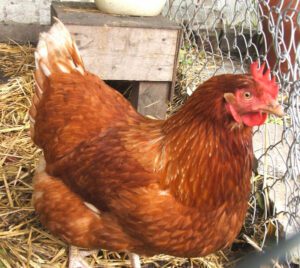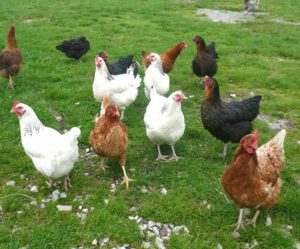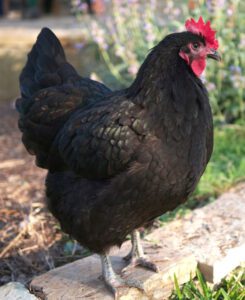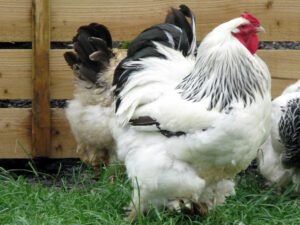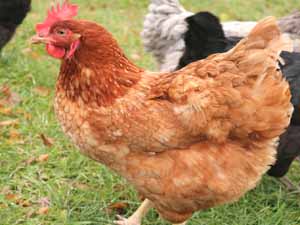Communicating with chickens is very easy and simple and you can learn to communicate with them easily.
You just need to spend some time with them, watch their activities and listen to their various sounds.
Chickens are actually very vocal and they communicate with each other frequently, just like humans.
Actually chickens are rarely quiet for long, unless they are sleeping. The type and range of sounds that chickens make are wide and somewhat open to human interpretation.
Communicating With Chickens
Chickens actually can’t talk like humans, but they make several sounds for communicating. Mother hens talk to their babies when they are out.
Some hens call other hens in the flock when they find something interesting to eat or explore.
The roosters will give a distinctive cluck when they find food so his hens can gather and eat. A rooster will give a warning cluck when he feels like his hens are in danger.
You can learn most of these language or sound simply by listening to and observing your flock. You can learn a lot about the ways of communicating with chickens if you spend some time with your chickens on a regular basis.
Most of the people who are not familiar with chickens are often surprised to realize how intelligent, aware, sensitive and fun the chickens are, and how interesting and sweet it is communicating with chickens. However, here we are describing more about the ways of communicating with chickens.
Listen to Their Sound
Listen to the sound closely and notice what they are doing when they make a certain sound. Each specific sound has specific meaning.
So listen to their sound closely, and notice what they are doing after making that specific sound.
Clucking
Generally mother hens will make a certain clucking instinctively to her chicks when she is out and about with them. When the mother hen make clucking, this means ‘she is calling her babies, and she has found something interesting to eat, scratch at or play with’. Some rosters will also often make similar sound and the meaning is same.
Cackling
After laying eggs, most of the hens generally make a loud calling noise. And many times other hens can also join in, and it can go on for a few minutes. Some people say it’s a yell of relief, and others call it a signal of pride.
Growling
Chickens can make a growling noise occasionally. Especially the hens make this sound when they are sitting on eggs and if someone disturbs them. It’s actually a warning sound and may by followed by a peck or an attack.

Perp-Perping
These types of sounds are made by the roosters. They make a soft ‘perp-perp’ sound for calling the hens over to a good supply of food. And the hens also make almost similar sound for alerting their chicks to a food source.
Squawking
Chickens make this loud sound if you grab or scare a chicken. Sometimes other chickens run when they hear the noise, and other times they are attracted (depending on the circumstances).
Other Noises
Along with the above mentioned sounds, your chickens can also make other types of sounds. Baby chicks make different sound, the hens make a sort of crooning sound when they are nesting.
Some hens seem to be humming when they are happy and contented. And the roosters in the flock will sometimes make aggressive fighting sounds. You can sit around the chicken coop/house for long time and you will hear the whole range of sounds.
Communicating with chickens
You can easily communicate with your chickens by listening their sound closely and also by monitoring their activities after making a specific sound.
Teach Them to Come When Called
You can sort of teach them to come near you when called if you are far away from your chickens. You can similarly cluck to the food call ‘chick chick chick………chickies!’. Do this regularly and your chickens will learn gradually. Using higher tone while doing this will be good.
Singing to the Chickens
Singing can be a good way for communicating with chickens. You can actually make any king of clucking-ish sound like ‘craaaaaaaaaaaw cruk cruk crawwwwwwwwwwww!’. You should use a quiet low tone of voice.
Listen to Their Warning Calls
After regular listening, you will be able to sort out the warning calls of your chickens. Go running to them after listening the warning call to keep them out of danger. If you are able to keep them out of danger, then it will be very helpful for bonding with your chickens and they will be in love with you. 🙂
Make Special Sound
You should make special sound for special occasions. Chickens are very intelligent and they are capable of learning. And if you use one specific sound or call for one task constantly, then they will learn the sound gradually.
If you really want your chickens to respond to a certain sound, then make it constantly for same task. For example, use a specific sound while feeding them and make the same sound each time you feed them. Chickens are just like other animals and they will learn your distinctive call gradually for feeding time.
After making the same sound during feeding time for several days, your chickens will come running every time you call them (because they love to eat).
Hold Your Chickens
You should also hold your chickens occasionally. Doing so will also help to bond with your birds. And if possible visit your lovely birds as often as you can.
The more time you spend with your chickens the more you will be able to learn the sounds they make, and the quicker you will become able to communicate with them. Chickens are lovely creatures and they generally enjoy human company in most circumstance. You will need a vocal cord and patience for taking or communicating with chickens. God bless you!

